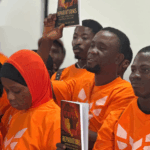
The Pan-African Progressive Front (PPF) has urged students to rise and join the fight for reparations, stressing that only a united Africa can transform the decades-long demand into reality and confront neo-colonialism.
Speaking at a public lecture at Accra Technical University (ATU) on Friday, 19 September 2025, the Managing Editor of the Insight newspaper and PPF Coordinating Committee member, Kwesi Pratt Jnr, said Africa’s fragmentation remained the biggest obstacle to justice for the continent.
“Reparations are not a dream. They are a historical right. But unless Africa speaks with one voice, the imperialist powers will continue to divide and cheat us,” he declared, drawing loud applause from the packed hall.
Mr Pratt, author of Reparations: History, Struggle, Politics and Law, argued that Africa’s demand was supported by concrete economic figures — trillions of dollars in restitution for slave labour, colonial plunder, stolen artefacts, debt exploitation and climate damage.
He reminded students that reparations were about more than financial compensation. “They are about resetting the world and reclaiming our dignity,” he said.
Humphrey Quaye, Head of the PPF Headquarters in Accra, added that reparations could not be separated from Pan-Africanism.
“Without unity, our calls for justice will remain empty slogans. The future belongs to young people who understand this truth and are ready to fight for it,” he told the gathering.
For many of the students, the lecture proved a turning point.
“This lecture has opened my eyes. We can’t keep waiting for others to define our destiny,” said Patience Sarfo, a first-year Biomedical Engineering student at ATU.
“If we unite and believe in ourselves, nothing is impossible,” she added.
Another student, Gideon Appiah, a final-year Cybersecurity major, offered a cautious note: “Pan-Africanism is powerful, but unity won’t be easy. Our leaders must be courageous and the citizens must stand firmly behind them.”
At the end of the forum, active participants were presented with copies of Mr Pratt’s book Reparations: History, Struggle, Politics and Law, which sets out practical strategies to pursue reparations, including estimates valuing Africa’s claim at over $10 trillion.
The lecture formed part of PPF’s campus sensitisation series aimed at educating young people on Pan-Africanism, the struggle against neo-colonialism, and the economic case for reparations. Students were taken through the devastating impact of colonisation — from unpaid slave labour to the plunder of Africa’s natural resources — and the urgent need to restore historical justice.
The PPF also commissioned a documentary film for students, Reparations: The Colonial Debt, produced in Kenya.
The session revisited the historic 5th Pan-African Congress held in Manchester in October 1945, where leaders such as Kwame Nkrumah and Jomo Kenyatta declared a new phase in Africa’s independence struggle.
Speakers urged today’s youth to complete the unfinished work of those pioneers.
The lectures come ahead of the landmark Pan-African Conference scheduled for Accra on 20–21 October to mark the 80th anniversary of the Manchester Congress. The event will draw representatives of Pan-African movements, trade unions and political parties, with heads of state expected to open the proceedings. Reparations will be the central focus, alongside economic and political development programmes for a united Africa.
Grateful for the engagement, students called on the PPF to hold more such lectures to further awaken Africa’s youth.